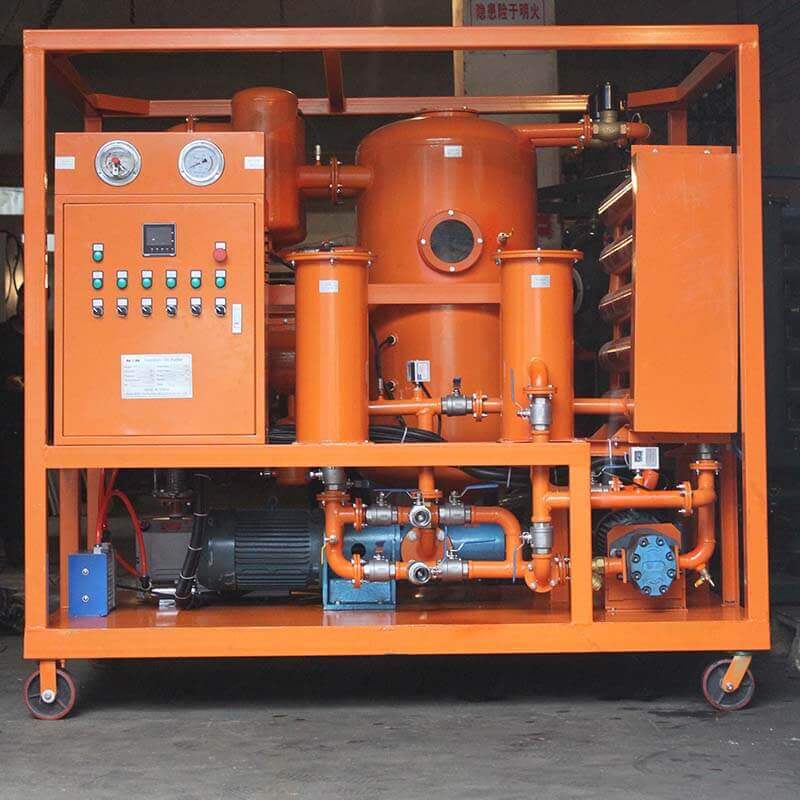E-mail seo@sino-purification.com

Time:2025-10-28 14:12:52 Reading volume:
The temperature requirements for oil filtration equipment depend on the type of oil, filter design, and specific process needs. The goal is to reduce viscosity through proper heating to improve filtration, dehydration, and degassing efficiency, while maintaining safety and oil stability.

Insulating Oil (Transformer Oil)
Purpose: Dehydration, degassing, and impurity removal to restore dielectric strength.
Reference: IEC 60422 and State Grid maintenance standards.
Recommended Range:
General: 40°C – 60°C
Optimal: 50°C – 60°C
Note: Below 40°C, viscosity is too high for effective flow. Above 65°C, oxidation accelerates and may degrade insulation performance.
Lubricating Oil (Turbine, Hydraulic, Engine Oil)
Purpose: Remove wear particles, moisture, and oxidation byproducts.
Recommended Range:
General: 40°C – 65°C
For drying/demulsifying: 55°C – 65°C
Note: Temperatures below 40°C reduce flow; above 80°C, oxidation and additive breakdown occur.
Fuel Oil (Diesel and Heavy Oil)
Purpose: Remove moisture and solids to protect fuel systems and improve combustion.
Recommended Range:
Diesel: 20°C – 40°C (low viscosity, minimal heating)
Heavy oil: 60°C – 80°C or higher to reduce viscosity for flow and filtration.
Vacuum Oil Filter
Highly temperature-sensitive; removes water by heating under vacuum.
At a vacuum of -0.09 MPa, water boils near 45°C, so heating is typically 50°C–60°C.
Overheating causes oxidation and foaming—temperature and vacuum must be precisely matched.
Plate and Frame Pressure Oil Filter
Uses filter paper and pressure for separation, with heating to improve flow.
Typical Range: 40°C – 60°C (must not exceed 80°C to prevent fire hazards).
Centrifugal Oil Filter
Uses centrifugal force to separate water and impurities.
Recommended Range: 40°C – 70°C, depending on oil type and viscosity.
Maximum Limit:
For most mineral oils, heating above 80°C increases fire and oxidation risks.
Oxidation Control:
Oil oxidation rate roughly doubles with every 10°C rise, so maintain the lowest effective temperature.
Follow Manufacturer’s Manual:
Always use the temperature range specified by the oil purifier manufacturer for safe operation.
Consult Oil Data Sheets:
The oil’s TDS or MSDS provides recommended operating and storage temperatures.
Final Recommendations
When operating oil filtration systems:
Start at around 40°C and increase gradually to balance flow and efficiency.
Monitor oil temperature continuously to avoid overheating.
Always follow equipment and oil specifications.
Combine proper temperature, vacuum, and filtration precision for best purification performance.
Root Causes of Loss of Control in Vacuum Oil Purification Systems
How Industrial Oil Filters Remove Water and Impurities: A Comparison of Technical Principles
How to Choose the Right Industrial Oil Purifier: A Comprehensive Buyer’s Guide
How to Choose the Right Oil Purifier for Different Oil Types?
Double-Stage Vacuum Pumping: The Complete Guide to Transformer Maintenance